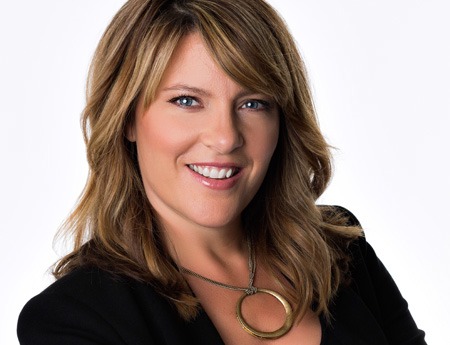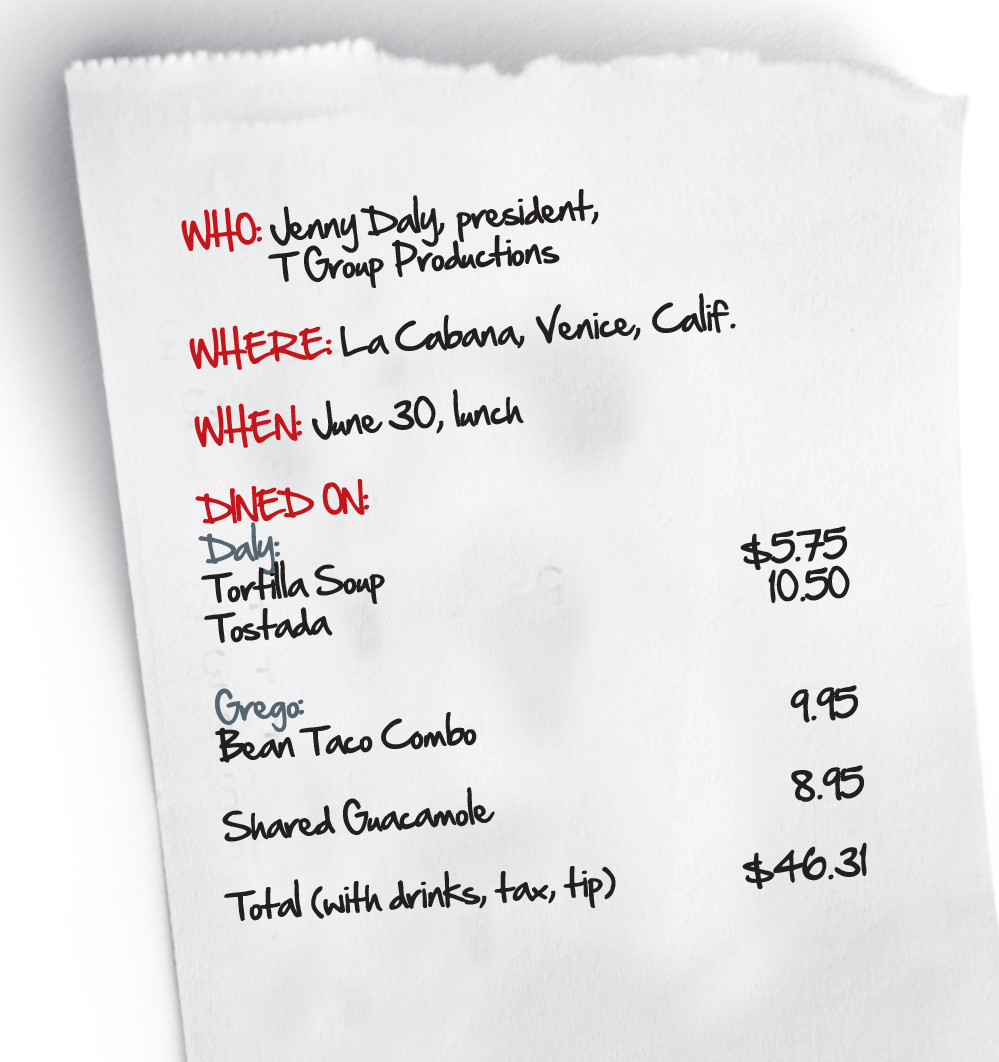Mel's Diner: Grilling T Group’s Jenny Daly On Her Independence Days

The smarter way to stay on top of broadcasting and cable industry. Sign up below
You are now subscribed
Your newsletter sign-up was successful
THE DISH: Amid the wave of acquisitions and consolidation in the production community, Jenny Daly, who has created, sold and produced more than 50 series, pilots and presentations since establishing T Group Productions in 2010, remains one of the few true independents.
A rare reality TV pro, having been an in-the-field executive producer, a buyer as an exec at E! and for last few years an entrepreneur running her own indie production company, she said she’s seen people sell their production companies time and again for the wrong reasons (well, one wrong reason): money.
“Money doesn’t bring you happiness,” Daly said just ahead of the Independence Day holiday over traditional Mexican fare at La Cabaña. The restaurant is a family favorite in her Venice, Calif., neighborhood. “What does is a business that is running in a way that you feel is strengthening and prosperous and has momentum.”
It’s no coincidence that the power of money to motivate is on Daly’s mind at lunch. The night before, she returned to L.A. from Ohio, where she shot the final episode of reality series Wicked Offer, which debuts Aug. 5 on The CW. The show challenges people to consider what they would do for a windfall.
In the last year, Daly forged a series of strategic coproduction partnerships to continue growing T Group, which is behind Food Network’s Mystery Diners, Storage Hunters (formerly on truTV, currently going strong in the U.K., recently sold in France and in negotiations to air in Germany), truTV’s Container Wars and History’s Invention USA.
Recent copro deals include pacts with Jack Osbourne’s Osbourne Media (they are rebooting The Osbournes together), Canadian producers Matthew Kershaw and Jay Kovitz’s Interior Day Entertainment (providing a natural path to a larger Canadian presence for T Group), Ann Lewis Roberts’ Roberts Media (Daly notes Roberts’ strength with talent and packaging of network shows as a great addition) and British producers Natalka Znak and Simon Jones and their Znak&Jones (providing added entry to the U.K. market as Storage Hunters continues to do well there). Several of her collaborators are relocating to her L.A. offices, where she likes to keep a “family-run” atmosphere, welcoming the staff’s dogs and bringing in breakfast once a week.
Over guacamole made table side and other classics, Daly spoke about the future of the reality genre and what it takes to thrive as an independent in this era of consolidation. Edited highlights of the conversation follow.
The smarter way to stay on top of broadcasting and cable industry. Sign up below

What’s the concept of Wicked Offer?
It’s basically, ‘What would you do for money?’ And in the end, who would you put in a situation that would jeopardize your relationships for money?
The greatest thing about it is in every episode, what’s really been clear to everyone who has participated is that money isn’t worth it.
What do you think the next big thing is in reality? Is it social experiments like this?
The shows that I think are prevailing are the ones where you know there’s maybe a formula— or concept, or framework—that you have bought into, but everything that transpires is true to life.
We had no idea what was going to happen this weekend (shooting Wicked Offer). We had a framework, but we don’t know how the couples are going to respond.
How much opportunity do you see for the reality genre in the digital world?
Everybody is interested in digital. I’m a content creator. So my content can live anywhere. But digital is very different (from linear networks), of course, because they don’t have a time slot they have to fill. They don’t have an amount of hours that they have to program for. It’s a matter of figuring out content that resonates with an audience and a reason why they want to watch it.
Are you finding the opportunities in so-called digital can be as lucrative at this point as they are among linear networks?
Reality has not aggressively fed into the digital platforms yet as a financial moneymaker. A lot of times they want condensed reality for a less amount of money, but it’s growing and adapting.
But truth be said…we know that networks are going to become like an app. [We will] click on “Lifetime,” for example, and see their programs. So you’ll still be creating programs for Lifetime, you’re just not necessarily eventually going to watch it as a linear outlet. You’re going to watch it as that app, as a brand, and under it will be shows.
You and Jack Osbourne are working together on the new version of The Osbournes, which I understand is not going forward at VH1, after you were working on that with them. What’s happening with the show?
We’re in the midst of putting a deal together. We were going to go to VH1, but that deal couldn’t be closed, which was unfortunate.
We’re looking at kind of a multitude of outlets of how to reapproach it, and we actually have another project with some of the family members that is really a fun project that we just recently sold. Instead of just The Osbournes as a sole focus, we actually have different members doing different projects as well. And that’s fun. [Editor’s Note: A lifestyle format with Sharon Osbourne and a concept in the travel historical arena with Jack and Ozzy Osbourne are both in the works in addition to The Osbournes reboot, but Daly was mum on the network homes while the projects are being finalized.]
How is the hustle as an entrepreneur different from your other gigs in the business as an EP and a network exec?
I’ve never really been somebody who has done a ton of jobs working for other people. I’ve actually worked for myself a lot. I started in college working with ESPN on their Senior PGA Tour as a kind of freelancer, so it would be my choice as to what jobs I took or didn’t take.
The difference as a network executive is that you are very much focused on a very specific brand. And you have a big, moving engine that is a lot of parts that you have to be accountable for. It teaches you what it really takes to make a TV show, and all of the entities that are involved in the decision- making.
Great insight as a seller.
Amazing insight! I’m so grateful I had it.
The pressures that are different are you’re getting a paycheck from somebody else, so you’re not always hoping to God that this sells, that sells.…The pressures being an executive are, Will a new boss come in? Will I be liked? Will I be somebody who is going to last here? Am I somebody who is getting the hit show that I’m getting the recognition for?
If you’re in a network and you don’t get a hit show, then it’s a little less, I would say, hurtful than as a producer not getting a hit show. Because then it’s yours, you take it on. Where at the network, it is ‘Oh, it’s another one I did.’ And they have many going on for them at that network.
What has surprised you most since establishing T Group?
What surprised me is what growth means. As you grow, it becomes more and more complicated. You would think that growth and success would be like, ‘Yeah, I’m doing great!’ That’s when life becomes harder. When you have to take on more and you have to maintain. And there are people you are accountable for at this point. And there are monies going out that are significant. And the level of decisions that you make on a day to day-to-day basis is immense.
You’re the only one keeping yourself up every day. Nobody is out there really championing you but you. And I don’t have a partner I can say to, ‘I’m feeling like shit today. How do you feel?’
You could have a partner. I know you’ve been approached for mergers or acquisition. To this point, you haven’t taken anybody up on that. What would an offer need to look like for you to say yes? I think it really comes down to aligning with somebody who brings more to the table than I am doing myself. And there are a lot of great companies out there. But it also feels like we’re in a shifting time in our business, so I think I want to shift and make sure my feet are planted well before I align them with somebody else.…I want to be in the best place I can be, which is why I am bringing more people on, which is why I’m aligning (with coproducing partners) and growing and building, so that as I come together with somebody else, it’s a bigger conglomerate.
What’s the most important thing you think you need to do to grow and adjust with the times as an independent?
Being aware and being unafraid to jump. I think as a company, I jumped. I think that is the biggest way to be successful in this kind of state. We just actually sold a digital show, scripted. It’s shifting and growing and taking on different areas that are out of your comfort zone. And I think that to me as a company has been the most scary, but most rewarding.
